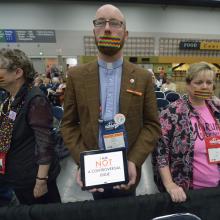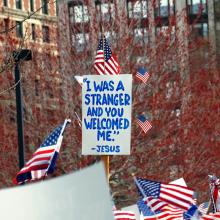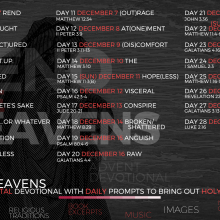Scripture
If you or a loved one have been impacted by suicide or self-harm, there is nothing to be ashamed of. Scripture teaches us that when one person suffers, we all suffer. Yet if you are in a place of active suicidal ideation, or having self-harming thoughts, it can feel like you have been completely swallowed by the dark; it’s a lonely and terrifying place. But here is the truth: You are wanted on this earth.
As it turns out, the person who needed The Rehearsal most was Fielder himself. His interaction with Angela in the finale reveals that the whole enterprise is actually an exploration of the inevitable pain humans cause others, even when we’re not trying to, and our need for grace and self-forgiveness.
Scripture is quoted twice in the latest season of Stranger Things, a first for the Netflix original that introduced us to the military experiments happening in the small Midwestern town of Hawkins, Eggo-loving Eleven, and the magic of Steve Harrington’s hair.
Most English translations of the Bible use exclusively masculine pronouns to refer to God, and the presumed maleness of God has become the default mindset of many Christians. But does the precedence of masculine pronouns require Christians to refer to God only with masculine pronouns forever?
How would our world change if we let trees remind us that there exists a natural landscape that transcends the geopolitical, that their branches and roots will not be stopped by the lines drawn on a map by people with various agendas?
In the cliffs high above the Dead Sea archaeologists chip away with pick axes, hoping to repeat one of the most sensational discoveries of the last hundred years - the finding of the Dead Sea Scrolls.
The scrolls, a collection of manuscripts, some more than 2,000 years old, were first found in 1947 by local Bedouin in the area of Qumran, about 20 km east of Jerusalem.
They gave insight into Jewish society and religion before and after the time of Jesus, and spurred a decade of exploration, before the search fizzled.
Recent finds have stirred fresh excitement however, and archaeologists are probing higher and deeper than before. Hundreds of caves remain unexcavated and the experts are racing against antiquities robbers.
Calling people “animals” misses the mark on all of this, even if the comment only referred to gang members. No, we shouldn’t shrug at evil or avoid calling out awful things and people who are causing great suffering — an important part of our power with language. But even in naming evil we’re to be guided by love for the suffering and those who cause suffering. Jesus loved the criminal on the cross next to him on Golgotha. Each person is made in God’s image and loved by God.
@JesusofNaz316 has a funny-sad-outraged quality. He sometimes uses the platform for irony or jokes, but more frequently for protest — sometimes against general injustice, but more often against the hypocrisy of Christians. His account, which has more than 16,000 followers, has been active since 2010. He is followed by progressive clergy like Diana Butler Bass and Rachel Held Evens and rabbis Danya Ruttenberg and Jonah Geffen, along with theologians and pastors from across denominations.
The long history between the church and LGBTQ people is one fraught with tension, pain, and, sometimes, violence. Those who believe that homosexuality is a sin often point to several well-known Scripture passages from the Old and New Testaments. Most of the Christian debate about human sexuality has centered on interpretation and emphasis of these passages.
In his book God and the Gay Christian , Christian LGBTQ activist Matthew Vines challenges LGBTQ-condemning interpretations of these Scriptures — sometimes referred to as “clobber passages.” But these clobber-texts aren’t the only Scriptures that can guide faithful Christians as we seek a godly understanding of sexual and gender identity.
In the same-sex marriage discussion, people cite 2,000 years of church history to support their suspicions of affirming theology. But this same history offers plenty of examples of healthy theological shifts that actually counter tradition. Healing on the Sabbath went against thousands of years of history. Replacing circumcision with baptism went against thousands of years of history. Even the Reformation went against 1,500 years of history, with the Reformers’ claim that they better understood the church fathers than the church did. History reveals that the church is always learning, always engaging in a re-examination of core values.
It is the tragedy of Christianity that the first hate crime in our constellation of texts is Matthew’s, in his telling the story of the passion. Jesus was a great teacher, an inspiring healer, and a man whose radical compassion touched everyone — women without honor, under-employed fisher folk, Roman soldiers, gentiles, Samaritans, scholarly Pharisees. The hearts of Palestinian Jews flocked to him, and this terrified the Romans. They tried to abort his movement by making his death a spectacle of cruelty and unutterable degradation.
Since it was unveiled last week, President Trump’s proposed budget has been widely denounced as “immoral” and downright “evil” for boosting defense spending by billions while demanding drastic cuts to vital aid programs.
Yet if liberals and some conservatives are upset about cuts to programs that help ensure clean drinking water, give financial aid to low-income college students, and even help support Meals on Wheels — which delivers nearly a million meals a day to the sick and elderly — would Jesus have a problem with slashing assistance to the needy?
While they told Moses that, “All the words that the Lord has spoken we will do” (Exodus 24:3), in the end they turned to idols and broke God’s laws. By the time we get to First Samuel, we hear the people clamoring for an earthly king so they could be like other nations (1 Samuel 8:4-22). They thought life would be better if they shook up their system of government, so they ditched the judges and looked for an outsider. In the end, they got exactly what they asked for – a king named Saul who was wicked and moody and paranoid.
“God raised up, I believe, Donald Trump,” said former U.S. Rep. Michele Bachmann after he won the GOP nomination. “God showed up,” the Rev. Franklin Graham said to cheers at a post-election rally. “God came to me, in a dream last night, and said that Trump is his chosen candidate,” said the televangelist Creflo Dollar.
For those who share this view, Trump’s victory was nothing short of miraculous, especially given that he beat out 16 other in the Republican primaries — some of them evangelical Christians with long political resumes.
For many Christians who observe the liturgical season of Advent, leading up to Christmas, an Advent devotional is a beloved companion.
Such devotionals typically include a short Scripture reading and reflection on the birth of Jesus.
But most are “crap,” according to the Rev. Jason Chesnut of Baltimore.

Image via bikeriderlondon/Shutterstock.com
"The Reformation gave at least a segment of Christians access to the Bible in a way that hadn’t happened before. Most of our history has been a rather Bible-less Christianity that was dictated or defined mostly by the hierarchical church, not by people who read the Bible. … We gained the freedom to approach it, and then in the current age, we have ceded that exploration to media, to entertainment forms, to prepackaged interpretations that are delivered in video, audio and pulpit forms so that there’s a substitute Bible that isn’t the Bible, per se, at the same time that people aren’t reading."

Billion Photos / Shutterstock
NOT LONG AFTER graduating college, I read everything I could find about various expressions of Christian community. Somewhere along the way, I stumbled upon the stories of Dorothy Day, Peter Maurin, and the other Catholic Workers who would follow in their footsteps. I remember being immediately captivated by the Catholic Worker vision for hospitality houses that were community hubs for both action—growing food, feeding the hungry, protesting American militarism—and learning—cultivating conversation and reflection on radical Christian faithfulness and the socioeconomic vision that defined the movement.
Although perhaps more widely admired for their activism and works of mercy, the Catholic Workers have long published a newspaper that is a catalyst for their social vision—fusing the stories of scripture, saints, and literature with the ubiquitous challenge to live faithfully in an age marked by greed and violence. In the words of Maurin, an essential part of their mission is to make “workers out of scholars and scholars out of workers.”

Photo via Paul Jeffrey / UMNS / RNS
The United Methodist Church is struggling to maintain unity amid deep divisions over Scripture and sexuality, the presiding bishop of America’s second-largest Protestant denomination acknowledged.
Bruised and battered in body and spirit, many victims of domestic violence are looking to faith communities for guidance. We must do more to make sure our congregations are safe spaces for survivors of abuse. And that starts with naming the sin of domestic violence in our churches and examining how our own sacred texts have been misinterpreted to condone such abuse.
This October—as part of Domestic Violence Awareness Month—we’re featuring a new online series called Troubling Texts: Domestic Violence in the Bible. With thought-provoking commentary from experts, pastors, and emerging scholars, we'll take a hard look at how scripture has been used to justify domestic violence.
















